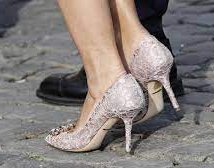@PublicationsEdm's Shoe Intelligence news outlet estimates that the withdrawal of Western brands has generated huge opportunities for Russian companies to insert their own products or reintroduce Western labels through parallel imports. [How the exodus out of Russia is creating opportunities for locals
Western footwear retailers that pulled out from the Russian market over the past few months in the wake of Russia’s invasion of Ukraine sold products worth 51.2 billion rubles (€911m) in the country in 2021, estimated Chestny Znak, a Russian regulator supervising the labelling of fashion products on the domestic market.
Overall, Western fashion retailers that quit Russia generated sales worth an estimated 100 billion rubles (€1.77bn) last year, Znak said, adding that Adidas, Puma, Zara, H&M, Massimo Dutti, Christian Dior, Louis Vuitton were among the leaders in their segments.
And the list of companies suspending operations in Russia keeps growing. On June 30, a Russian news outlet reported that Converse decided to pull out from the country and shut down its online store in July. Converse is following the lead of its owner, Nike, which also announced plans to leave the Russian market permanently. Meanwhile, H&M, which had suspended sales in Russia on March 2, or just a few days after the invasion of Ukraine on Feb. 24, announced that it would start winding down its business in Russia. “After careful consideration, we see it as impossible given the current situation to continue our business in Russia,” said Helena Helmersson, the CEO of the Swedish retailer.
But, the withdrawal of Western brands has generated huge opportunities for Russian businesses to place their own products or reintroduce Western labels through parellel imports, a practice that was authorized by the Russian government in May. The scheme enables to import branded goods without the authorization of the brand owner.
If Russian demand remains at the levels seen before the breakdown in the relationship between Russia and Western countries, ”Russian companies operating on (digital) marketplaces can increase sales volumes at the expense of those of companies that have suspended their activities,” said Revaz Yusupov, deputy general director of the Russian Center for Advanced Technologies Development.
“These goods will be imported to the Russian Federation under the parallel import scheme. Already, we see that many sellers on marketplaces have started selling goods of the listed brands using this scheme. Moreover, the demand for goods of these brands will remain consistently high for a long time to come,” he added.
Russia’s leading online marketplaces, Wildberries and Ozon, have already reported that they started utilizing parallel imports to reintroduce some Western brands in the market. Over the past months, some Russian government officials have indicated that Western products could be supplied to Russia via Turkey, Kazakhstan and China.
However, Russian businesses have voiced concerns that parallel imports could increase the risk of counterfeiting. Dmitry Leonov, deputy chairman of the Russian retailers association Rusprodsoyuz, clearly stated that parallel import could be useful to fill retailers’ shelves but the country could be exposed to importing counterfeits.
Leonov warned that importing counterfeit goods could end up impacting Russian manufacturers, as poor-quality products sold under popular labels could hamper sales of Russian businesses.
On July 7, Vladislav Zaslavsky, deputy director of the Russian Industry and Trade Ministry’s digital marketing department, claimed that the online retailer had begun selling counterfeit products. Zaslavsky said that the ministry had already received complaints from customers and business organizations.
Wildberries dismissed its involvement in selling counterfeit goods, adding it had an automated counterfeit detection system.
In the meantime, Wildberries has expanded its warehouse capacities in Nur-Sultan, the capital of Kazakhstan, by 2.5 times. The company added it planned to launch two more logistics hubs in the country in Aktobe and Semey. The online retailer stressed that the expansion is not aimed at facilitating parallel imports but primarily to attract more Kazakh-made products to its marketplace.
In the wake of the mass withdrawal of Western brands, 80 percent of Russians said they support the revival of Soviet brands, a research conducted by the Moscow-based University of Synergy showed. In addition to old car brands abandoned over the past few decades, Russians are interested in Soviet shoe brands. Most respondents participating in the survey believe their revival would provide the country with affordable and good-quality products.


